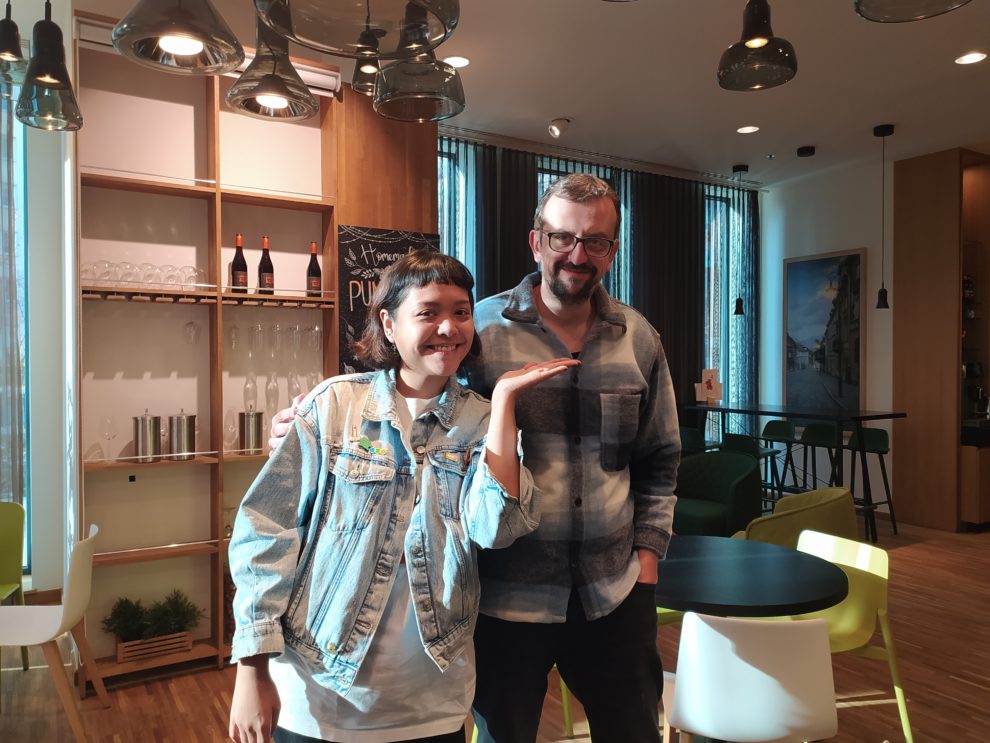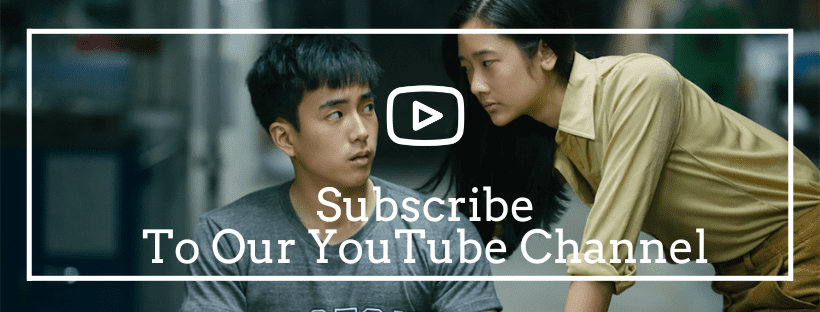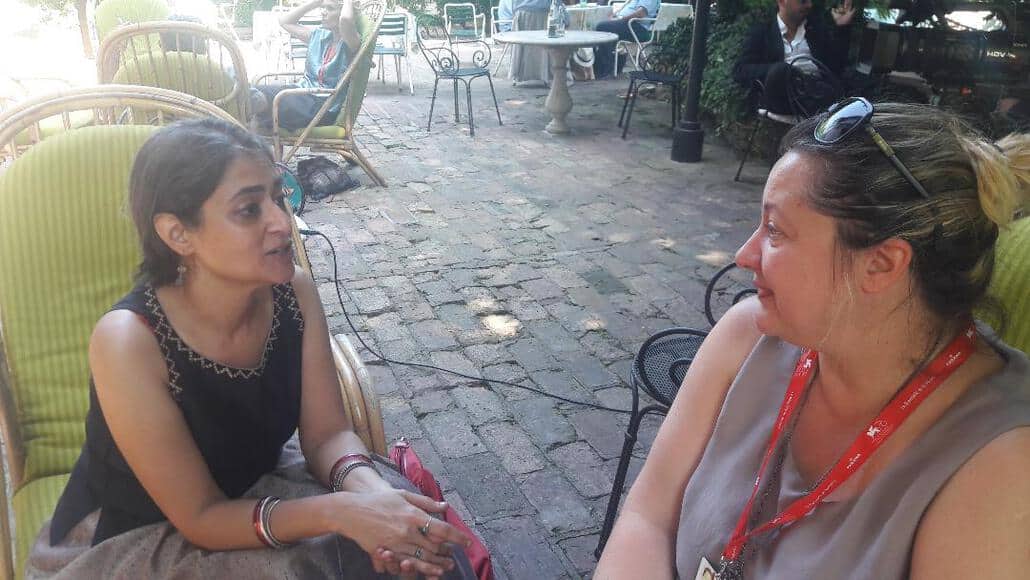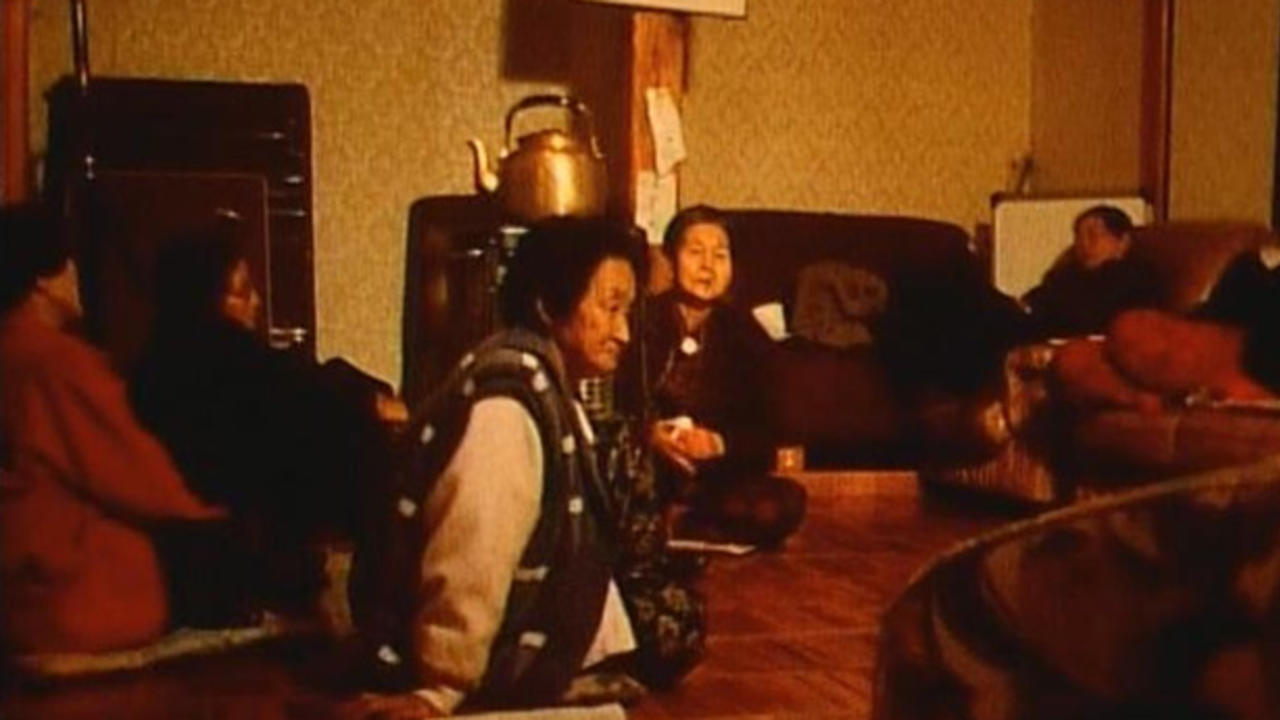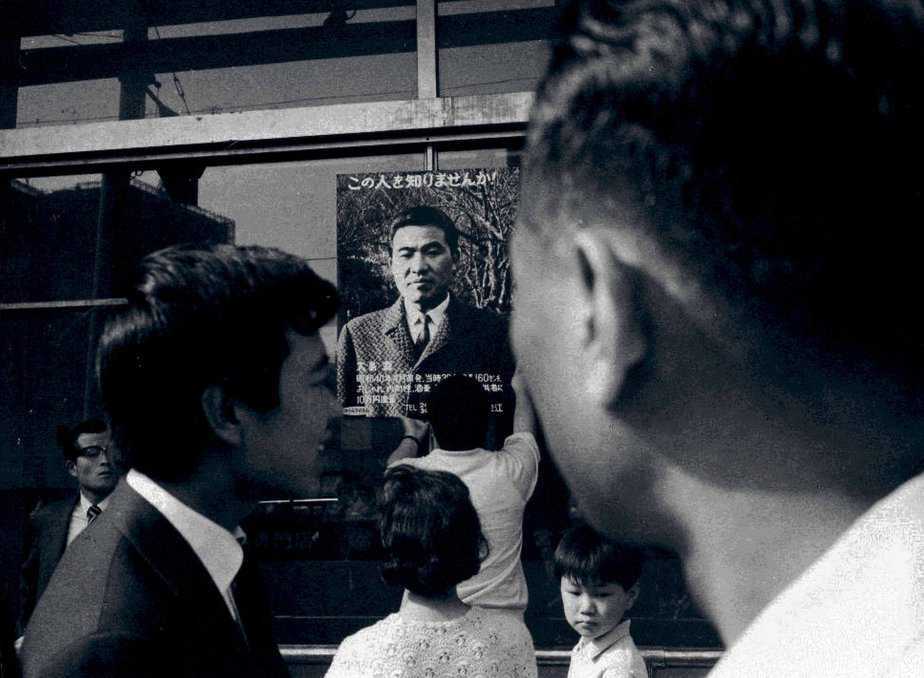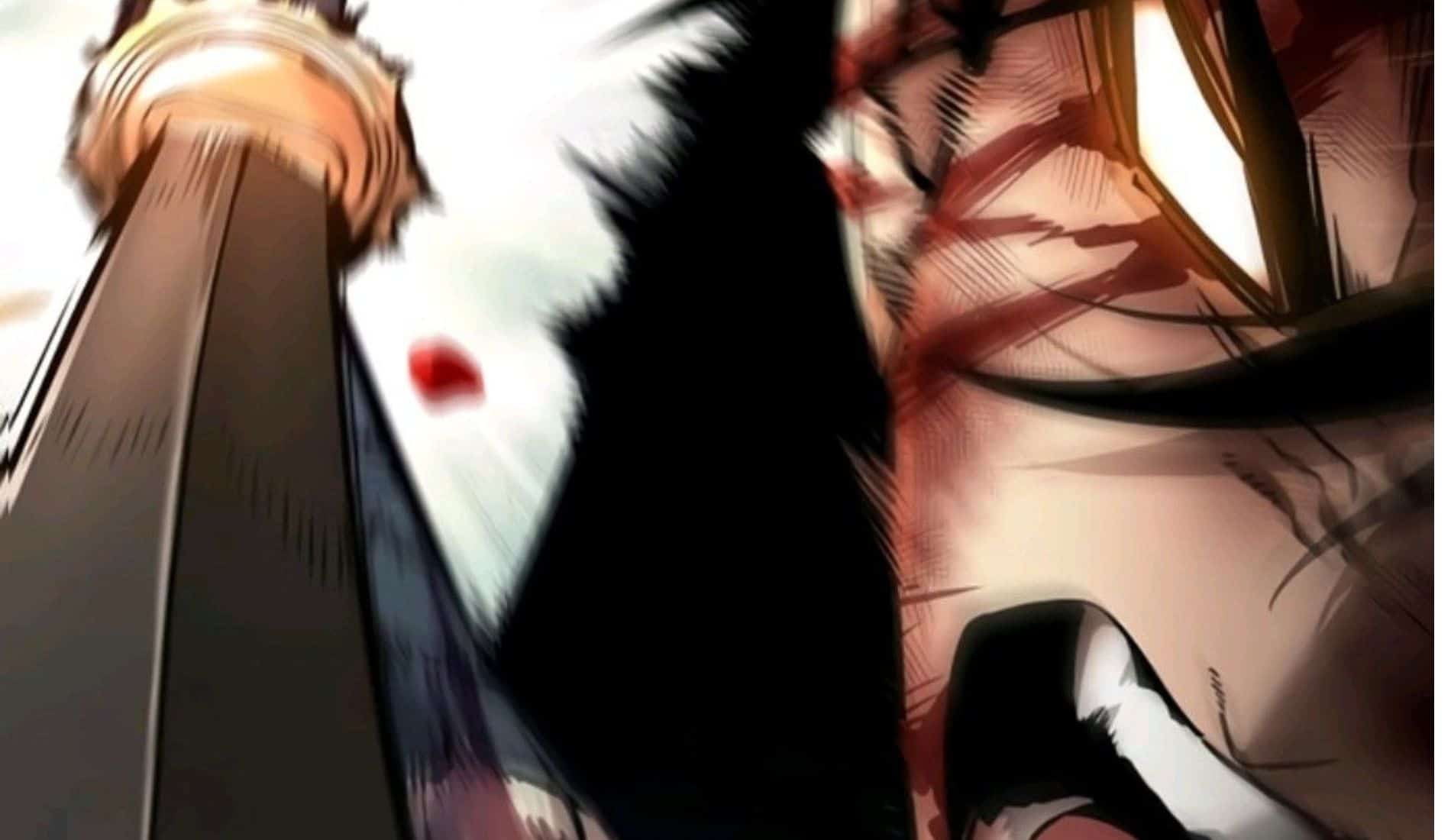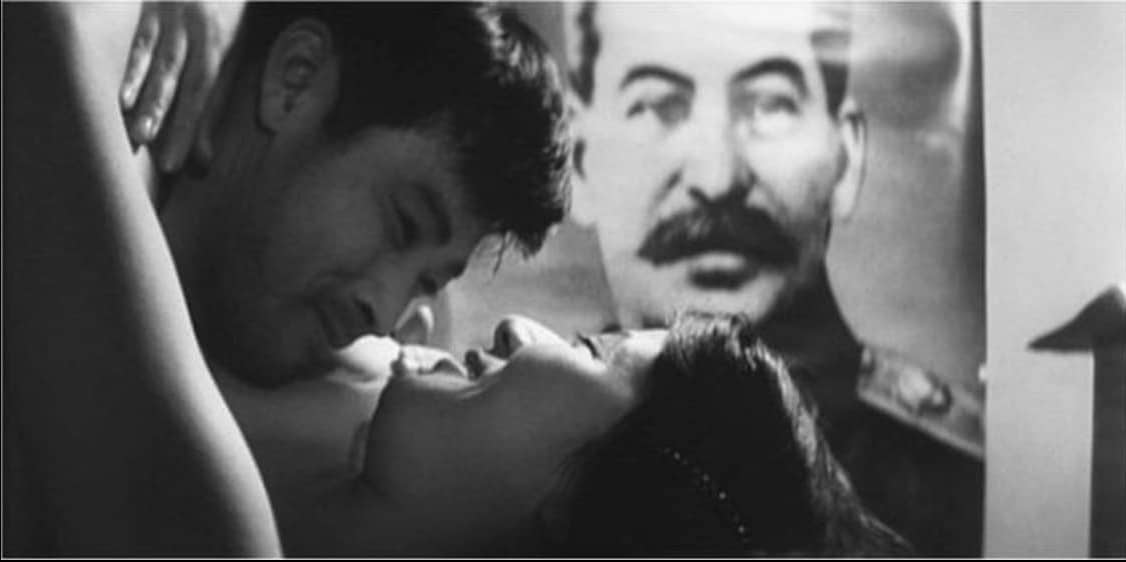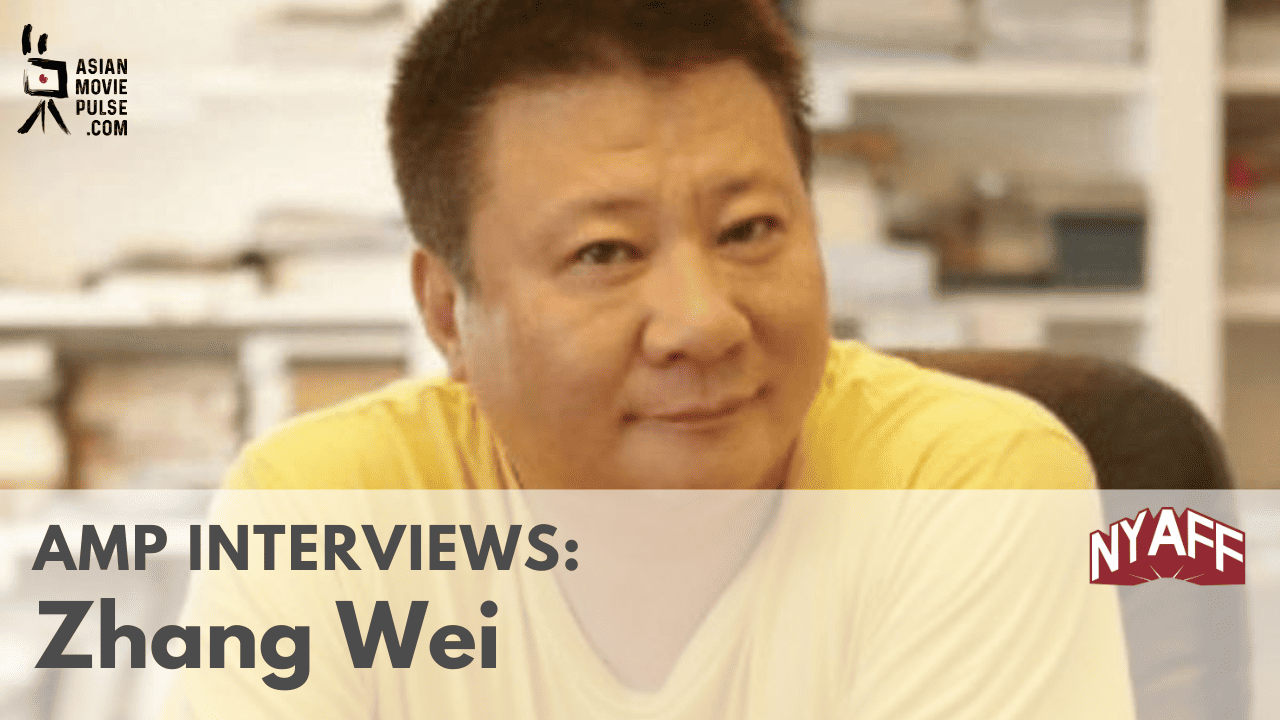Martika Ramirez Escobar is a Philippine director and cinematographer, born in Manila in 1992. Before her debut, “Leonor Will Never Die”, she worked as a freelancer in local production houses, and made a number of shorts that captured the attention of festival audiences.
On the occasion of “Leonor Will Never Die” screening at Five Flavours, we speak with her about the ending of the movie, Filipino cinema of the 70s, her grandmother, Monster Jimenez, Mario Cornejo and Lawrence S. Ang, and many other topics.
Leonor Will Never Die is screening at Five Flavours

Why didn't you have Leonor kill them all with the hammer in the end?
(laughter) The protagonist does not like to kill people, so she definitely wouldn't. Instead, she tries to change how action films are like, where she would kill all people at once, and so she tries to solve problems by talking to them, telling them to communicate with each other in more tender and peaceful terms, so she definitely would not kill. However, it would be nice if the mayor or some other villain killed everyone using a hammer.
How did you come up with the scene where she dances in the end?
The Filipino films of the time, until the 90s, would often end with a dance sequence and usually freeze the last frame. I don't know why they kept on doing it, they probably saw it in Hollywood films, but it is something I see too often, to the point that it is on my mind and I wanted it to be the same ending for “Leonor”. I also wanted the different worlds established, so I wanted action in the real world and I wanted it to feel as one, cause you think that they are different worlds but essentially are utterly connected somehow. Even with the meta world, that is why I decided to include our team in the dance sequence as well.
How difficult was it making three films into one, particularly since the acting, the cinematography and almost every other aspect, differ so much?
To divide the worlds was not so difficult, particularly because we had a set of rules per world. I had a list of things to follow like a lens choice, a camera choice, blocking choice. However, to strengthen the differences, in the action part I wanted to mimic action films for example, so they are usually shot with multi camera and zoom lenses all the time, they usually block according to the stunts and then in the real world, I wanted it to be more of people moving around the space. One lens, wide shots, and no camera movements at all, I wanted the approach to be more observational. It was easy to define those two worlds but the meta world, the last one I did, the way it appeared in the film is through what we captured from our interns, our photographers, my one clips, so I added it when we did not have an ending. It is not that I intentioanlly thought of the treatment for the third, meta world.
Did you shoot them at the same time though?
We shot them according to blocks, three days real world, three days action world, three days meta world. The last five days of pick up shoots and additional ending was done a year later in 2020, right before the pandemic. I shot those scenes because my producer said we did not have an ending and so we did a lot of additional sequences.
Do you believe in ghosts?
Of course, yeah. Do you?
I am not sure (laughter)
At least in the Philippines or SE Asia, ghosts are a normal thing, they often are shown as scary or haunted in films, even in the aforementioned regions, but really in our culture, ghosts can be a form of spirit guides, they give comfort to people. I see ghosts as that, and the story of the ghost in the film is based on my grandma. She had a son who passed away, the same age as the ghost, and when he passed away, she would often feel or “see” him, like seeing the bed sinking as if he was here, she felt he was beside her, she would see things move. Instead of looking at it as something scary, she saw it as the presence of her son, telling her that it is ok, or not ok. So, I wanted Ronwaldo to be a safety ghost, so whenever he appears in the film, it is when his family members are in trouble or are sad, so he is there as a friend.
What is the story of Leonor based on?
Upon a lot of stories, but mainly my grandma who is sort of obsessed, without realizing, with watching films. In the Philippines, when you are a senior citizen, you can enter the cinemas for free every Monday and Tuesday. And you can watch up to three films per day. In the past 12 years, she has seen every single film in the cinema, definitely many more than me, and she just enjoys it. She remembers them, it is not that she is going to sleep, she just likes watching films. I really like my grandma and so Leonor is largely influenced by the character of my grandma, who sees so much beauty in life when I don't. Usually, when I talk to my grandma, she redeems my hate towards the world and that is why my dream is to have the same wisdom as her, how to stay so calm and positive in this chaotic world. I wanted Leonor to be similar to that.
That is one part, the other is that in the history of Philippine cinema, out of 300 action films per year, none of them was about a grandma, there are a few about women, but they are very very few and even then, they are treated as if they were men, they are strong women, women with guns, it is not a feminine treatment. I wanted to explore having a woman in a macho genre. Leonor is also based on this concept, and when I did my research, the writers whom I talked to only came with one name of a female action writer and director, which is super rare. Her name is Maria Saret, and her films are just like other films, they are not special.
Do you like the films of that era?
I did watch a lot as a child but I do not remember the titles. You know the feeling when you need white noise to sleep, I think in a normal, middle class household in the Philippines, the normal thing to do is to turn your TV on the whole day and what plays during 2-5 pm are action film replays. As an only child, since I was there doing nothing, I watched them, and I remember them, but I cannot really recall the titles. It is something familiar to my generation because we are used to that, and that is why I think my generation is most responsive to the film because they are familiar with the feeling of watching these replays on TV. I did my research by watching not a lot, about 20.
Do you like Lino Brocka's films?
I do but I like Gabriel Bernthals films more and Kidlat Tahimik and Mike De Leon. Their films resonate more with me.
Do you watch more foreign or Filipino films?
I am sorry to say I watch more foreign films. I am not feeling bad about it because it is hard to find, and I am not supposed to say this, good quality Filippino films. There are many films being shot, but they are mostly sex and exploitation films that go straight to platforms, so to find films that are meaningful and films that elevate the cinematic value or craft is not that easy.
To go back to your film, how long did it take from the moment you started writing until the moment it was concluded?
8 years, but we shot 2019, so it is not so long ago. The long part was writing the film, because I work as a cinematographer in the Philippines, and this made me a bad writer so I had to enroll in all these workshops in the Philippines just to find my way into making a readable script. I did workshops under the writers of Brillante Mendoza and Ricky Lee who has written hundreds of Filipino films and he is our national artist. I spent four years writing a script that was not even good in the first place. That and the begging for investors took a lot of time, since “Leonor” looked like a project that was risky to invest into, many people turned us down.
You used the word ‘begging'
Of course I begged, I would send emails to each company, ‘can you please help us with a small amount, a technical sponsorship'. Even my producers did so, I think we reached out to everyone in the Philippines. But in the end, there were only two people who supported us.
In the end, how much was the budget of the movie?
Around $250,000 but if you include the sponsorships, it is probably closer to 300,000. We had a 22 day shooting. It is not small, but I wanted more, particularly because I paid my friends friendship rates.
How did Monster Jimemenez and Mario Cornejo get involved?
I used to work for Monster's company as a brainstormer, so when I was a fresh graduate, I would go to her office and just brainstorm ideas for their commercials.When she found out I had a script and I wanted to make a film, by chance, we were in Laos and she was asking me who was the producer of my film. I told her I was the producer and then she told me that they could read my script if I wanted to and it was actually Mario who really liked it, not Monster. Mario said he wanted to produce it. I think they were going through a phase where they were supporting young filmmakers at the time, so they took me in as their first project, as producers, because they usually work only for each other and this was the first time they ventured out of that. Mario was saying that this is a film that he would never make, so he liked the idea of supporting someone who wants to make it. They are the best! I think the two of them are the best producers in the Philippines.
How was the reception of the movie in the Philippines?
It was so bad, it was the worst. It was the opening film of Cinemalaya, and it was a free screening, the first time Cinemalaya had happened after two years, so there were many people and it was a cheerful crowd and the warmest reception. After that we had a few screenings organized by us, so it was mostly our family, our friends, our colleagues and it was full. However, after the fourth screening, it died… It didn't really reach strangers, it didn't really reach people who did not know us. So, I have to say it is a failure. We were losing money more than earning cause we were paying for our own screenings, we would book the cinemas ourselves. We did not do a commercial release because we knew no one would go.
Are you disappointed?
I think I am more frustrated than disappointed because we thought this type of film would appeal more, because it is fun and it is a family movie you can watch with friends and family. But it didn't work that way. People talked about it but it feels like it is a very niche audience and still, the audience in the Philippines don't go to cinemas unless for Marvel movies (laughter)
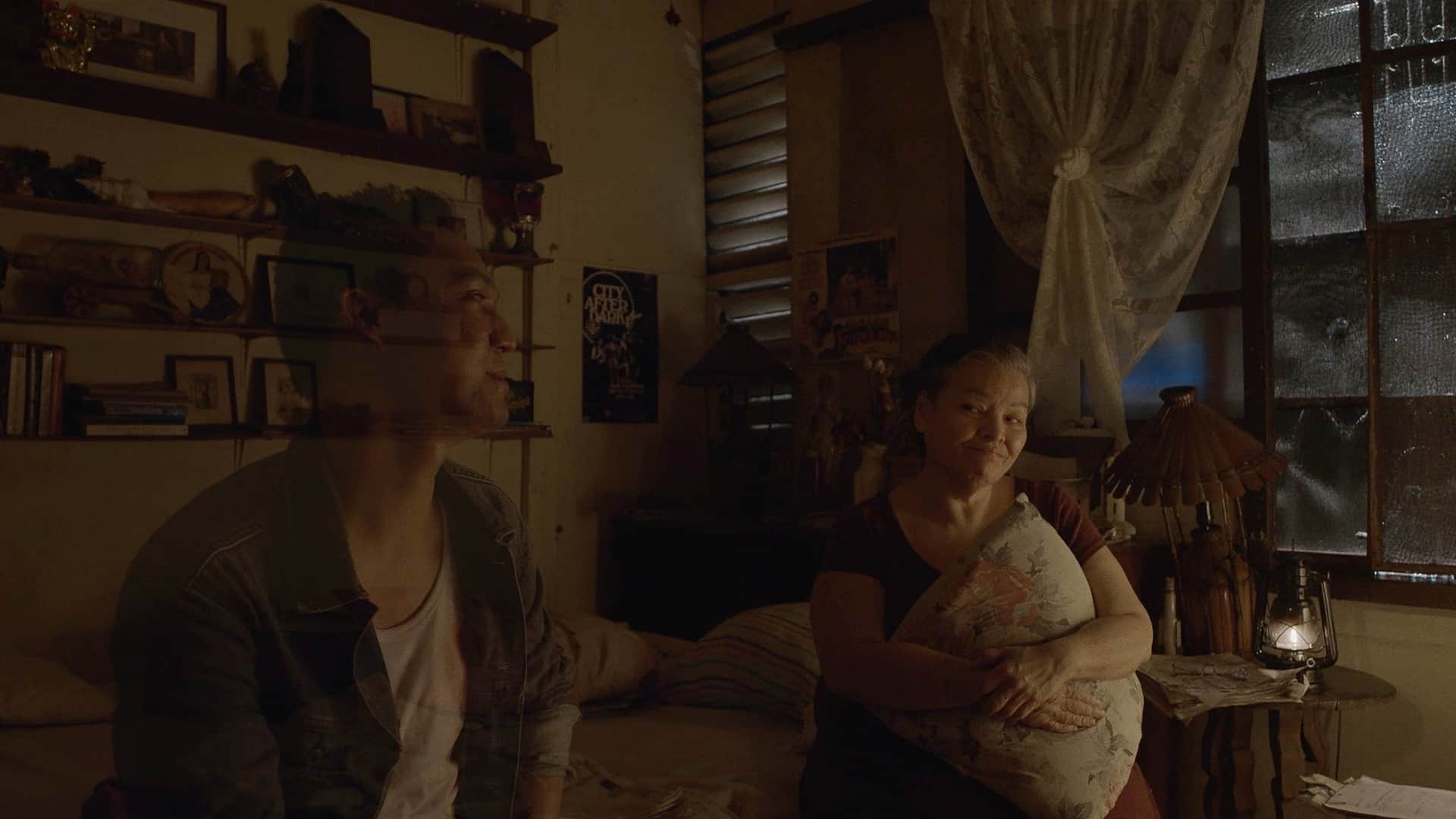
Has your grandmother watched it?
She did, twice, and she said, “Oh, you made an action film'
Sounds like a judgment.
Yes, and I also know that it is her way of blocking herself from the truth that most parts of the film are based on her real life, like not paying the electricity on time. Even the dead son that we don't talk about..
Can you tell me a bit about the casting?
It was a journey of its own. We had more than 20 days of casting, I would personally invite people to my home and just ask them to read. I was supposed to make the reading part official, but what I like is talking to them, knowing their vibe because it is important to have good vibes from a person. Sheila Francisco possessed a quality that was very similar to me and also similar to how I see Leonor, and similar to my grandma. She is this fierce, adventurous, independent woman who is obsessed with following her passions, so there was a time when she was into cooking so she became a chef, she became a producer, an actress, a singer, she is an ideal person. I thought she would be perfect for Leonor, and she is also a lovely person. It was easy for Sheila, but for everyone else, it was a long process. I shuffled the roles, I would ask them to read for a particular character but I ended up casting them for another. Monster would do the same so we had different branches. I would read in my home, Monster in her office and my line producer would sometimes go somewhere to record a video. We have a collection of auditions, enough to make a feature film. It was a fun process.
What about Ronwaldo?
Ah, the one with the nice butt (laughter) Rocky Salumbides appeared in several independent Filipino films, of Mikhail Red for example, and he would often play the lead or supporting characters and when I was looking for a mysterious, hunky, period-looking person, he was highly recommended by people. When I met him in person, I realized he is really like that, he is mysterious. Even when we were shooting, he was strange. I thought that there was something he possessed that would work with Ronwaldo. I think he did really well. He is a non-actor actually, he used to be a carpenter or something.
Tell me a bit about the action scenes. Was it difficult to shoot them?
I think it was easy. When I look at action films, it looks like you just need multiple cameras to cover a stunt, but apparently, you need to place the camera at a certain height and angle, and a certain lens, so a punch would work, an upkick would work, a broken table would work. We spent so much time blocking objects and people and extras which I didn't expect. So, Monster decided to add more shooting for the action scenes, since she thought we were slow, and Mario stepped in as assistant director in these scenes because he is more into it and more knowledgeable. We would be directing at the same time. I worked closely with them. Monster would sometimes rewrite for me, when she thought that what we shot yesterday is supposed to change today. And I was like, “Really?” . In the morning, she would suggest, she would write actually, she would show me and then we would talk about it. If I liked it we would shoot it, and if I didn't, we wouldn't. It worked like that and that is the reason there is a sense of cohesion in the film, because in my mind, they are random ideas that make sense but in their minds, they are abstract. It was Mario and Monster who found the glue to all the random ideas in my head. That is how the film became accessible. I think without them, the film would be a strange mess.
Did you fight?
Yes! I cried, we fought. I am not a confrontational person, but Mario was suggesting so many things, so at one point, I hid under the stairs and I cried and they were looking at me and when Mario saw me, he apologized and that was the beginning of a bit of distance, but healthy distance. Because, since Mario and Monster are directors, there are times when they can be too imposing in their decisions. When they realized that their attitude was making me insecure, they stepped away, something I highly respect and appreciate. We had a distance and they kept that distance at editing, although I knew they were itching to do so many things but they entrusted the final decisions to me.
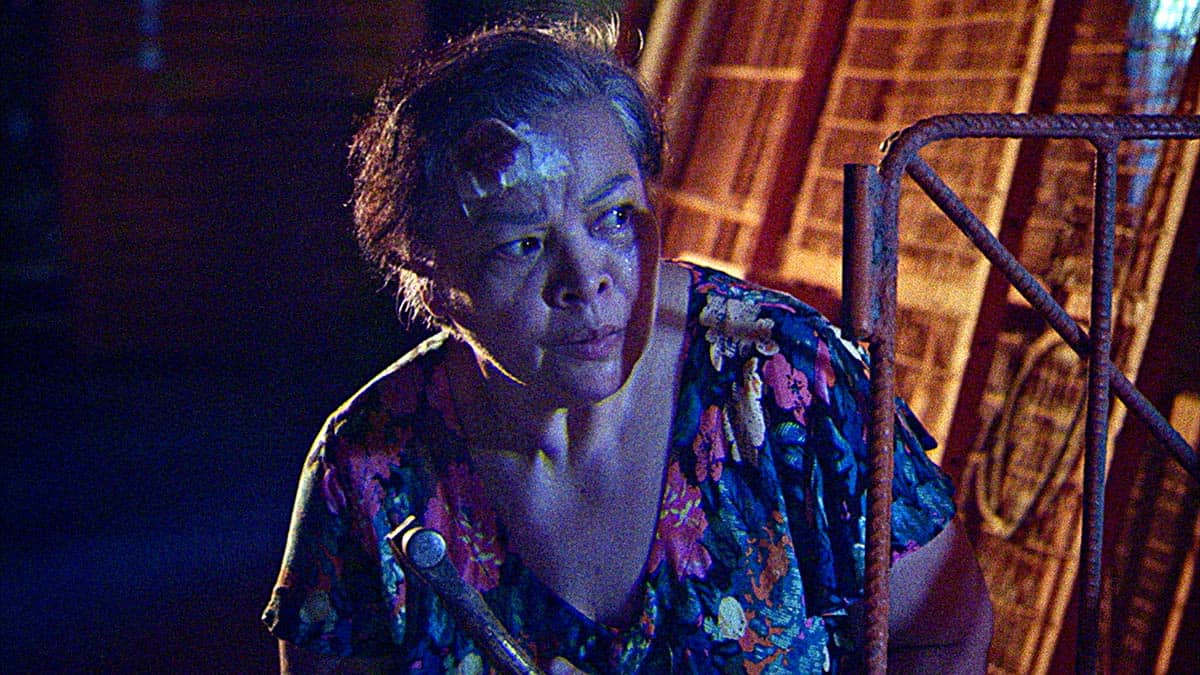
Since you mentioned the editing, tell me a bit more about it.
It is the worst. I am sure Lawrence S. Ang enjoyed the process, cause this is the type of film I feel an editor would have difficulty with but also enjoy it. We did enjoy it, but there were 24 versions of the film (laughter). He is super patient, he does not fight, we only have conversations about what could work and what could not. That actually sped up the process., which was already fast. If it was someone else, it might take us years to finish. The process was I would let Lawrence do his thing and then I would watch it and then we would talk about it and then Monster and Mario would watch and notice the weaknesses and we would work on them. When I thought the film was ok and good and ready for export. Monster told me the film does not have an ending. That was the time I asked Lawrence what were my options, additional shoot, do we add pictures, do we add more scenes? I recorded the conversation, the screen and that was what appeared in the last minutes of the film. Lawrence became an essential problem-solver by appearing in the film himself
How long did the editing process take?
Two years. We were editing even just before Sundance's deadline.
How was the reception at Sundance?
It was great, surprisingly, we got a lot of good reviews and response because it is the type of happy film that people will automatically not like but find joy in. Especially if you like movies, it is easy to appreciate “Leonor”, so it was a good run at Sundance. I think it was what led to our next screenings, as we then secured Toronto. I think we have been having an ok festival run and surprisingly, it is in genre festivals, something that I did not expect in the beginning.
In the end, are you happy with the result?
Oh, wow! Of course, I am beyond happy, it is quite surreal to have this interview, to be here, screening outside of the Philippines. But there is also pressure that comes along with it, and it is that pressure that makes me scared and sort of covers up the happiness. I think I should just go with the flow of it and enjoy the existence of the film while it is still alive, because by January, it is probably gonna die, it will probably not move around anymore after a year after its premiere.
What do you think of Filipino cinema at the moment?
The good part is that there are a lot of films, filmmakers and a lot of initiative to promote better filmmaking, like workshops, grants, co-productions, markets, they are all happening right now in the Philippines . However, I also realize there is a huge divide between the films made straight for platforms, which they tend to be exploitative, not only in the content of the film but also in the shooting practice and work ethics of that specific company. Most of the films are done under that company, so they would exceed shooting hours, they would cut budget, they would treat people not right and that makes me feel angry, makes me think why are these studios allowing this to happen, when they are the ones that have the power to prevent this from happening, because they have the money. I feel conflicted about it, but what I like is that there are so many young filmmakers also, and their work is much better than when I was a young filmmaker. We were making crappy films but now the young filmmakers make great films. I am happy with the number of movies, but I hope people get treated better in terms of production
In general, do Filipino people go to watch Filipino films?
I think it is the same as everywhere else, they would prefer Hollywood but in the Philippines, it is more of an economic problem. SInce watching films is a luxury, you cannot really expect anybody to get a ticket in the cinema, which is about 7 euros. This is really expensive for a country like the Philippines, you can buy two-days worth of meals with this amount. Also, if they are able to buy a ticket, they would watch a Hollywood film or the local rom-com with the biggest love theme around, so on November 25, a new film will be released in that fashion, and they expect it to be a huge blockbuster. It was made by a friend, Petersen Vargas and it is called “Inconvenient Love”. And it is interesting, because the producers hired an arthouse director to make a mainstream film, something like Nawapol and his mainstream films. I have a feeling it is going to work, which is good, because they are elevating the quality of these films.
Are you working on anything new?
Yes, I am always working on something, right now it is our self-distribution that has been failing and also my second feature where Monster just said yes.
So you want to work with them again?
Of course, I would send Monster emails with headers like ‘Audition' and I would make my pitch in the audition (laughter). Because she is really picky, so many people ask her to produce their project and she never did until “Leonor”. I am happy she accepted the “audition” and I think it is because we already have a healthy relationship and also we trust each other. They are also making their own film so I am trying to help out in their work as well. I also work as a cinematographer, short films but also feature for a studio, a rom com actually (laughter) My dream is to work for other Asian filmmakers as a cinematographer, but it is hard to do so.


